In recent years, the concept of the gut-brain connection has gained significant attention in both scientific research and popular health discussions. The idea that the gut, often referred to as the “second brain,” can influence our emotions, thoughts, and overall mental health is both fascinating and transformative. As more studies reveal the complex interactions between our digestive system and brain, it becomes increasingly clear that what we eat can have profound effects on our mental well-being. In this article, we’ll delve into the gut-brain connection, explore how diet influences mental health, and offer practical tips for nurturing both your gut and your mind through food.
Understanding the Gut-Brain Axis
The gut-brain axis is a bidirectional communication network that links the central nervous system (the brain and spinal cord) with the enteric nervous system (the digestive tract). This connection is facilitated by the vagus nerve, a major nerve that runs from the brainstem to the abdomen, as well as by various hormones, neurotransmitters, and immune system signals.
Key Components of the Gut-Brain Axis:
- Vagus Nerve: This nerve acts as a primary communication highway between the gut and brain, transmitting signals in both directions.
- Neurotransmitters: The gut produces several neurotransmitters, including serotonin, which is often referred to as the “happy hormone.” In fact, about 90% of the body’s serotonin is produced in the gut.
- Gut Microbiota: The gut is home to trillions of bacteria and other microorganisms that play a crucial role in digestion, immune function, and the production of neurotransmitters. These microbes also influence the gut-brain connection and, consequently, mental health.
How It Works: The gut and brain are in constant communication. When the gut is healthy, it sends positive signals to the brain, which can enhance mood and cognitive function. Conversely, when the gut is unbalanced or inflamed, it can send distress signals to the brain, potentially contributing to mental health issues such as anxiety and depression.
How Diet Influences the Gut-Brain Connection
The foods we eat have a direct impact on the composition and function of the gut microbiota, which in turn affects the gut-brain axis and mental health. A diet rich in diverse, nutrient-dense foods supports a healthy gut microbiome, while a diet high in processed foods, sugars, and unhealthy fats can disrupt gut health and contribute to mental health problems.
Impact of Different Foods on the Gut-Brain Axis:
- Probiotic-Rich Foods: Foods like yogurt, kefir, sauerkraut, kimchi, and other fermented products contain beneficial bacteria that can enhance the diversity and balance of the gut microbiota. A healthy microbiome is associated with improved mood, reduced anxiety, and better stress management.
- Prebiotic Foods: Prebiotics are types of fiber that feed the beneficial bacteria in your gut. Foods rich in prebiotics include garlic, onions, leeks, asparagus, bananas, and whole grains. Supporting the growth of good bacteria through prebiotic foods can improve gut health and contribute to better mental clarity and mood stability.
- Omega-3 Fatty Acids: Found in fatty fish like salmon, mackerel, and sardines, as well as in flaxseeds and walnuts, omega-3 fatty acids have anti-inflammatory properties that benefit both the gut and the brain. Omega-3s can help reduce symptoms of depression and anxiety by supporting the integrity of gut and brain cells.
- Polyphenol-Rich Foods: Polyphenols are plant compounds with antioxidant properties that can influence gut health by promoting the growth of beneficial bacteria. Foods rich in polyphenols include berries, dark chocolate, green tea, and olive oil. These foods help protect the brain from oxidative stress and support mental well-being.
- Refined Sugars and Processed Foods: Diets high in refined sugars and processed foods can lead to gut dysbiosis, an imbalance in the gut microbiota. This imbalance can trigger inflammation and negatively affect brain function, potentially leading to mood disorders and cognitive decline.
How It Works: By choosing foods that support a healthy gut microbiome, you can positively influence the gut-brain axis. This, in turn, can lead to improved mental health outcomes, including reduced symptoms of depression and anxiety, better stress management, and enhanced cognitive function.
The Role of the Gut Microbiome in Mental Health
The gut microbiome plays a central role in the gut-brain connection, influencing everything from mood and cognition to stress response and immune function. A healthy gut microbiome is diverse, with a wide variety of beneficial bacteria that help maintain balance and prevent the overgrowth of harmful microbes.
Key Functions of the Gut Microbiome:
- Neurotransmitter Production: As mentioned earlier, the gut produces significant amounts of neurotransmitters like serotonin and dopamine, which are critical for mood regulation and emotional well-being.
- Immune System Regulation: A large portion of the immune system resides in the gut. A healthy gut microbiome helps regulate immune responses, reducing inflammation that can negatively affect the brain and mental health.
- Stress Response: The gut microbiome influences the body’s response to stress. A balanced microbiome can help modulate the production of stress hormones like cortisol, reducing the impact of stress on the body and mind.
How It Works: When the gut microbiome is balanced, it supports mental health by producing adequate levels of neurotransmitters, regulating immune function, and helping the body manage stress. Conversely, an imbalanced microbiome can contribute to mental health issues by disrupting these processes.
Practical Tips for Supporting Gut and Mental Health Through Diet
Nurturing your gut health through diet is one of the most effective ways to support the gut-brain connection and improve mental health. Here are some practical tips to help you get started:
1. Eat a Diverse Diet: Aim to include a wide variety of fruits, vegetables, whole grains, lean proteins, and healthy fats in your diet. A diverse diet supports a diverse microbiome, which is key to gut health.
2. Incorporate Probiotic Foods: Regularly consume fermented foods like yogurt, kefir, sauerkraut, and kimchi to introduce beneficial bacteria into your gut. You might also consider taking a high-quality probiotic supplement, especially if you’re not getting enough probiotics from food.
3. Focus on Fiber: Increase your intake of fiber-rich foods, such as whole grains, legumes, fruits, and vegetables. Fiber acts as a prebiotic, feeding the good bacteria in your gut and supporting a healthy microbiome.
4. Limit Processed Foods and Sugars: Reduce your consumption of processed foods, sugary snacks, and beverages. These foods can disrupt the balance of your gut microbiota and negatively impact your mental health.
5. Stay Hydrated: Drinking plenty of water supports digestion and helps maintain a healthy gut lining. Aim to drink at least 8 cups of water a day, and more if you’re physically active or live in a hot climate.
6. Manage Stress: Practice stress-management techniques such as meditation, deep breathing, and regular exercise. Chronic stress can negatively affect the gut-brain axis, so it’s important to find ways to relax and unwind.
7. Consider Omega-3 Supplements: If you don’t consume enough omega-3-rich foods, consider taking an omega-3 supplement to support brain and gut health. Always consult with a healthcare provider before starting any new supplement regimen.
8. Get Enough Sleep: Quality sleep is crucial for both gut and mental health. Aim for 7-9 hours of sleep per night to allow your body and brain to recover and rejuvenate.
Conclusion
The gut-brain connection is a powerful link that highlights the importance of diet in mental health. By making mindful food choices that support a healthy gut microbiome, you can positively influence your mental well-being, reduce stress, and enhance cognitive function. Remember, the foods you eat don’t just fuel your body—they also play a vital role in nurturing your mind. By prioritizing gut health through a balanced and diverse diet, you can take a significant step toward improving your overall health and happiness.
Tags: gut-brain connection, mental health, diet and mental health, gut microbiome, probiotics, prebiotics, omega-3 fatty acids, stress management, healthy eating, holistic health





